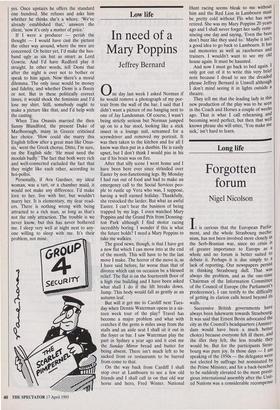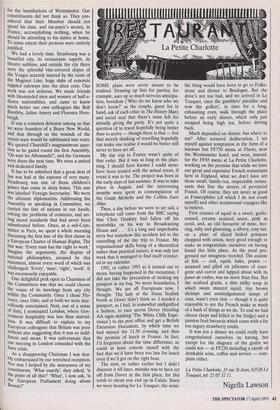Long life
Forgotten forum
Nigel Nicolson
It is curious that the European Parlia- ment, and the whole Strasbourg mecha- nism, has not been involved more closely In the Serb-Bosnian war, since no crisis is of greater importance to Europe as a whole and no forum is better suited to debate it. Perhaps it is due simply to a lack of reporting. Our newspapers persist in thinking Strasbourg dull. That was always the problem, and as the one-time Chairman of the Information Committee of the Council of Europe (the Parliament's predecessor), I can testify to the difficulty of getting its clarion calls heard beyond its walls.
Successive British governments have always been lukewarm towards Strasbourg. It was said that Ernest Bevin advocated the city as the Council's headquarters (Amster- dam would have been a much better choice) because everyone felt ill there, and the iller they felt, the less trouble they would be. But for the participants Stras- bourg was pure joy. In those days — I am speaking of the 1950s — the delegates were not elected by suffrage but nominated by the Prime Minister, and for a backbencher to be suddenly elevated to the most presti- gious international assembly after the Unit- ed Nations was a considerable recompense for the humiliations of Westminster. Our constitituents did not think so. They con- sidered that their Member should not spend his time, and tax-payer's money, in France, accomplishing nothing, when he should be attending to his duties at home. To some extent their protests were entirely justified.
We had a lovely time. Strasbourg was a beautiful city, its restaurants superb, its theatre sublime, and outside the city there were the splendid vine-covered slopes of the Vosges scarcely marred by the ruins of the Maginot Line, huge slabs of concrete toppled sideways into the alien corn. Our • work was not arduous. We made friends with likeminded men and women of half-a- dozen nationalities, and came to know much better our own colleagues like Bob Boothby, Julian Amery and Florence Hors- brugh.
It was a common delusion among us that we were founders of a Brave New World, and that through us the wounds of the recent ware would be sublimated into scars. We quoted Churchill's magnanimous ques- tion as he gazed round the first Assembly, Ou sont les Allemands?', and the Germans were there the next time. We were a united and dedicated family.
It has to be admitted that a great deal of fun was had at the expense of very many. Strasbourg was one of those children's games that come in shiny boxes. This one was labelled 'Foreign Secretaries'. We were the ultimate diplomatists. Addressing the Assembly or speaking in Committee, we carried the fate of nations in our hands, solving the problems of centuries, and set- ting moral standards that had never been adumbrated before. Once, at a sub-Com- mittee in Paris, we spent a whole morning discussing the first line of the first clause in a European Charter of Human Rights. The line was: 'Every man has the right to work.' Imagine the arguments, the display of national philosophies, aroused by this statement, almost every word of which was challenged: 'Every', 'man', 'right', 'work'. It was enormously enjoyable.
One delightful perk open to Chairmen of the Committees was that we could choose the venue of its meetings from any city within the Community. Once I chose Flo- rence, once Oslo, and at both we were mar- vellously entertained. Next, out of a sense of duty, I nominated London, where Gov- ernment hospitality was less than marvel- lous. It was difficult to explain to my European colleagues that Britain was poor without also suggesting that it was so indif- ferent and mean. It was unfortunate that Our meeting in London coincided with the Suez crisis.
As a disapproving Chairman I was dou- bly embarrassed by our wretched reception. Nor was I helped by the annoyance of my constituents. 'What exactly', they asked, 'is the point of all this?"What', I now ask, 'is the European Parliament doing about Bosnia?'



















































 Previous page
Previous page